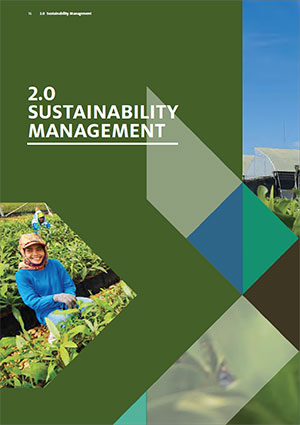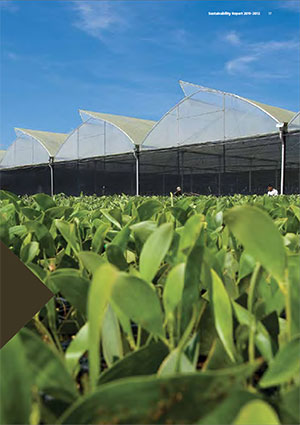With its population of 238 million people and considerable natural resources, Indonesia is on an inexorable journey to becoming a significant global economic force. However, with a per capita GDP that ranks 115th in the world and 12 per cent of its people living in poverty, this country still faces significant challenges.
Continuing rapid economic growth (6.2% in 2012) is creating conditions that will allow Indonesia to address some of its most pressing problems, in areas such as poverty, education, health and infrastructure.
Having operated successfully in Indonesia for the past two decades, we firmly believe that sustainable, responsible development contributes strongly to Indonesia’s response to its considerable challenges.
Sustainable businesses bring prosperity to local communities, improve education and skill levels and contribute to infrastructure development, while ensuring that environmental impacts are appropriately managed.
Riau province, the home of APRIL’s operations, exemplifies the importance of sustainable development in Indonesia.
In our business, operating industrial scale plantations and a major pulp and paper manufacturing plant, sustainable development entails:
- adherence to regulations
- accountability through significant international scrutiny
- protection of conservation forest areas
- rapid replanting of areas harvested
- a no-burn policy combined with active fire control in forestry activities
- sophisticated water management
- science-based carbon management
- community infrastructure projects
- creation of economic alternatives for local people
- the creation of economic multipliers, and
- providing the capital and resources necessary to ensure best practice.
APRIL’s sustainable forestry and pulp and paper operations have made a significant contribution to the rapid economic growth achieved in Indonesia’s Riau Province.
Riau province plays a key role in Indonesia’s overall development strategy, accounting for 6.7% of Indonesia’s national GDP in 2010.
Over the five year period 2007-2012, Riau experienced rapid economic growth, with GDP increasing by almost 200%. This is due to both government and private sector activity and has resulted in better living standards for Riau’s people in recent years.
From 2007 to 2012, poverty decreased by 17%. Nevertheless, in 2012, more than 8%, or more than 480,000 of Riau’s people were still living in poverty, while the rapid growth of the local population – more than doubling to 5.5 million over the last 30 years, brings additional challenges in raising living standards.
In this context, companies like APRIL, which have a direct, positive economic impact on Riau, are helping improve many lives.
Importantly, our business strategy includes a long-term presence in Riau, so we expect the economic benefits of our activities to flow through to residents for decades to come.
It should be noted that APRIL receives no significant financial assistance from national or local government in Indonesia. We do not rely on subsidies or incentives.
APRIL’s sustainable forestry and pulp and paper operations have made a significant contribution to the rapid economic growth achieved.
In 2012, we paid our employees in excess of $US72 million in wages, salaries and benefits. This is a considerable amount in Indonesian terms, but our contribution extends well beyond our employees.
In 2011, the Economic and Social Research Unit of the University of Indonesia completed an analysis of APRIL’s economic contribution. The conclusions of this study can be applied to the reporting period 2011-2012, since there were no changes related to our operations, or to Riau province, that would significantly alter the outcome of this study if it were concluded in 2012.
The study found that between 1999 and 2010, APRIL’s payments to employees, purchases from suppliers and contractors and investments in areas such as training, infrastructure and community benefits represented 6.1% of Riau’s gross regional domestic product (GRDP) and 5.4% of all household income in the province. The University of Indonesia study calculated that in 2009, APRIL created consequential employment opportunities for 90,000 people in Riau Province.
Economic Multipliers
The University of Indonesia study also measured the income and output multipliers of APRIL’s economic activity in Riau province. These indicate the extent to which our business activities within the province impacted on the local economy between 1999 and 2010.
The study found that for our forest plantations, the output multiplier was 1.50. Every additional dollar of timber sales from our Forestry business will increase the value of Riau’s output by 1.5 dollars.
The income multiplier for this business was measured as 1.36, meaning every additional dollar spent on employees increases household income in Riau by 1.36 dollars. The employment multiplier was 2.17 - for each additional person employed in our Forestry business, 2.17 employment opportunities were generated in Riau.
As our plantations are established and operated in accordance with Sustainable Forest Management principles, they are renewable resources. Therefore, the contributions our Forestry business makes to Riau will be ongoing.
The multipliers for our pulp and paper industries demonstrate the importance of our mill in adding value and scale within the Riau economy.
For APRIL’s pulp and paper businesses, the output multiplier was 2.29. So every additional dollar of pulp and paper sales increases the value of Riau’s output by 2.29 dollars.
The income multiplier was 2.36, so every additional dollar spent on employees increases household income in Riau by 2.36 dollars. The employment multiplier was 5.7 - each additional person employed in our pulp and paper operation generates 5.7 employment opportunities in Riau.
In terms of the economic development of Riau, we believe that value-adding operations such as our mill are important both as a means of retaining downstream economic benefits within the province and for the broad range of training and employment opportunities they bring to the Riau workforce.

